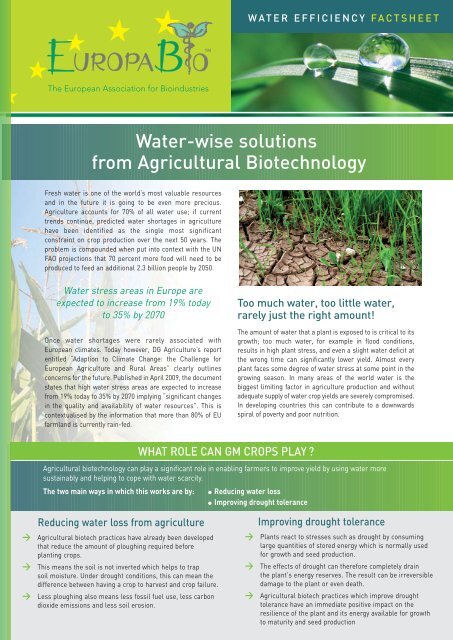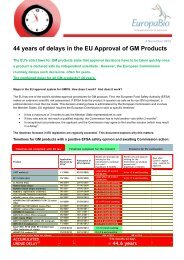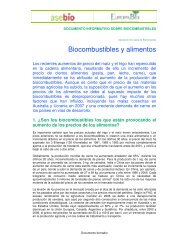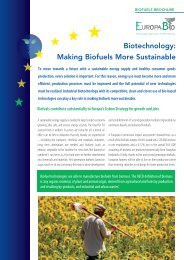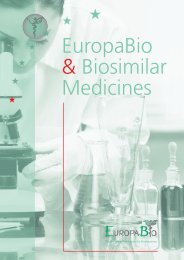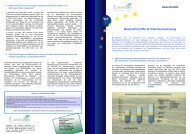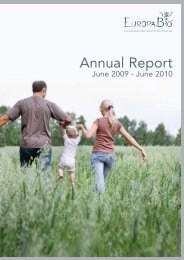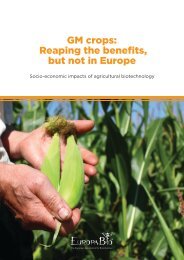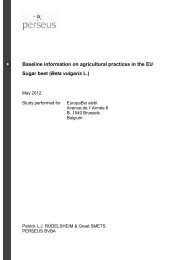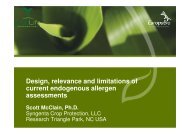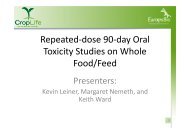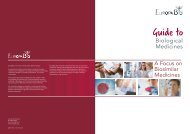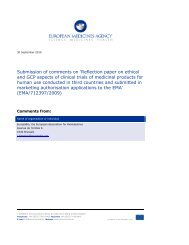Water wise solutions from agricultural biotechnology - Europabio
Water wise solutions from agricultural biotechnology - Europabio
Water wise solutions from agricultural biotechnology - Europabio
Create successful ePaper yourself
Turn your PDF publications into a flip-book with our unique Google optimized e-Paper software.
Fresh water is one of the world’s most valuable resources<br />
and in the future it is going to be even more precious.<br />
Agriculture accounts for 70% of all water use; if current<br />
trends continue, predicted water shortages in agriculture<br />
have been identified as the single most significant<br />
constraint on crop production over the next 50 years. The<br />
problem is compounded when put into context with the UN<br />
FAO projections that 70 percent more food will need to be<br />
produced to feed an additional 2.3 billion people by 2050.<br />
<strong>Water</strong> stress areas in Europe are<br />
expected to increase <strong>from</strong> 19% today<br />
to 35% by 2070<br />
Once water shortages were rarely associated with<br />
European climates. Today however, DG Agriculture’s report<br />
entitled “Adaption to Climate Change: the Challenge for<br />
European Agriculture and Rural Areas” clearly outlines<br />
concerns for the future. Published in April 2009, the document<br />
states that high water stress areas are expected to increase<br />
<strong>from</strong> 19% today to 35% by 2070 implying “significant changes<br />
in the quality and availability of water resources”. This is<br />
contextualised by the information that more than 80% of EU<br />
farmland is currently rain-fed.<br />
Agricultural <strong>biotechnology</strong> can play a significant role in enabling farmers to improve yield by using water more<br />
sustainably and helping to cope with water scarcity.<br />
The two main ways in which this works are by: Reducing water loss<br />
Improving drought tolerance<br />
Reducing water loss <strong>from</strong> agriculture<br />
> Agricultural biotech practices have already been developed<br />
that reduce the amount of ploughing required before<br />
planting crops.<br />
> This means the soil is not inverted which helps to trap<br />
soil moisture. Under drought conditions, this can mean the<br />
difference between having a crop to harvest and crop failure.<br />
> Less ploughing also means less fossil fuel use, less carbon<br />
dioxide emissions and less soil erosion.<br />
TM<br />
WATER EFFICIENCY FACTSHEET<br />
<strong>Water</strong>-<strong>wise</strong> <strong>solutions</strong><br />
<strong>from</strong> Agricultural Biotechnology<br />
Too much water, too little water,<br />
rarely just the right amount!<br />
WHAT ROLE CAN GM CROPS PLAY ?<br />
The amount of water that a plant is exposed to is critical to its<br />
growth; too much water, for example in flood conditions,<br />
results in high plant stress, and even a slight water deficit at<br />
the wrong time can significantly lower yield. Almost every<br />
plant faces some degree of water stress at some point in the<br />
growing season. In many areas of the world water is the<br />
biggest limiting factor in agriculture production and without<br />
adequate supply of water crop yields are severely compromised.<br />
In developing countries this can contribute to a downwards<br />
spiral of poverty and poor nutrition.<br />
Improving drought tolerance<br />
> Plants react to stresses such as drought by consuming<br />
large quantities of stored energy which is normally used<br />
for growth and seed production.<br />
> The effects of drought can therefore completely drain<br />
the plant's energy reserves. The result can be irreversible<br />
damage to the plant or even death.<br />
> Agricultural biotech practices which improve drought<br />
tolerance have an immediate positive impact on the<br />
resilience of the plant and its energy available for growth<br />
to maturity and seed production
Current research projects<br />
> The <strong>Water</strong> Efficient Maize for Africa (WEMA) partnership<br />
led by the African Agriculture Technology Foundation (AATF)<br />
is a five-year public-private partnership with the aim of<br />
developing new African drought-tolerant maize varieties,<br />
incorporating the best technology available internationally.<br />
The varieties developed through the project will be distributed<br />
to African seed companies through AATF without royalty and<br />
will be made available to smallholder farmers as part of their<br />
seed business. The national <strong>agricultural</strong> research systems,<br />
farmers’ groups, and seed companies participating in the<br />
project will contribute their expertise in field testing, seed<br />
multiplication, and distribution. The project will involve local<br />
institutions, both public and private, and in the process<br />
expand their capacity and experience in crop breeding,<br />
<strong>biotechnology</strong>, and biosafety. The current timing for the<br />
availability of the crop is 2017.<br />
Kenya has just announced its intention to commence field trials<br />
with this type of maize.<br />
> Hybrid crops such as maize have been developed to<br />
tolerate drought and periodic water deficits. During the next<br />
decade, a number of companies are planning to introduce GM<br />
crops that will further improve drought tolerance. While no<br />
plant can grow without water, hybrids and varieties are<br />
being developed that use water sources more efficiently and<br />
therefore perform better during water deficits. Maintaining<br />
yields during water stress will help preserve grower incomes<br />
and yield more grain for the food and energy value chain as<br />
well as reducing the need for irrigation.<br />
EuropaBio’s mission is to promote an innovative and dynamic<br />
<strong>biotechnology</strong>-based industry in Europe.<br />
For further information, please contact:<br />
EuropaBio Avenue de l’Armée, 6 - B-1040 Brussels<br />
Tel: +32 2 735 03 13 - Fax: +32 2 735 49 60 - greenbiotech@europabio.org<br />
www.europabio.org<br />
Printed on 100% recycled paper<br />
> This is not just at the research stage. Member companies<br />
have announced this year that they have made regulatory<br />
submissions in the United States and Canada for approval of<br />
drought-resistant maize, with the objective of launching the<br />
product in 2012.<br />
> Some research focusing on reducing the levels of PARP<br />
[poly(ADP-ribose) polymerase], a key stress-related protein in<br />
plants, resulted in oilseed rape which was far better able to<br />
survive drought than reference plants. Field trial results show<br />
relative yield increases of up to 44% compared to non-drought<br />
tolerant varieties. Research is currently underway on corn,<br />
cotton, oilseed rape and rice, with the objective of developing<br />
a new generation of stress-tolerant, high-performance crop<br />
varieties.<br />
> Further exciting work in this area involves the use of<br />
genetic switches called transcription factors and stress genes<br />
<strong>from</strong> microbial sources. Specific transcription factor genes<br />
have been tested that influence multiple other genes involved<br />
in the plant's response to stress. Drought tolerance has been<br />
improved, increasing productivity by at least two-fold during<br />
severe water stress.<br />
TM


